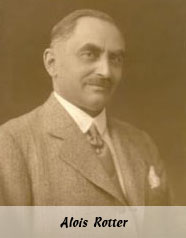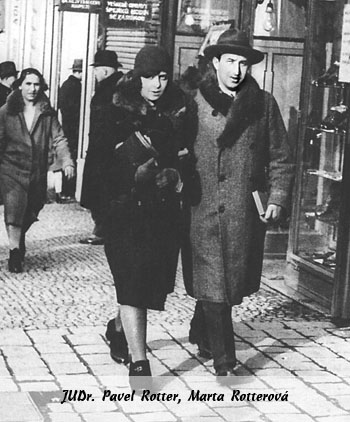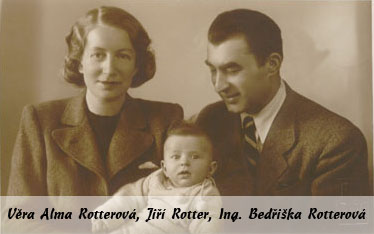OUR FINDINGS
ALMA PACHNER

Alma, the only daughter of Josef and Barbora, was born on June 14, 1877, in Německý Brod. She married Alois Rotter, born on March 16, 1878, in Čejč u Hodonína and was a merchant. For a short time after the wedding, Alois and Alma lived in Německý Brod, where they had twins, Pavel and Jiří.
We have found evidence that Alma and Alois later lived in Helenín u Jihlavy in 1909, where Alois worked in a textile mill owned by Karel Löw. They moved to Brno at some point and Alois allegedly became the director of a textile mill. Their son, Jiří, recalled a childhood spent in a villa in Brno-Obřany. There was a garden in which he and his brother used to play. Miss Emilie helped Alma maintain the household. She has remembered the times spent with the Rotters for many years after the war, and says that she has never been better since.
The Rotters later moved to Jihlava, where they lived at no. 9 on Matky Boží Street, later no. 28. In Jihlava, Alois ran a hosiery and yarn store called "Bareta". The company made knitted hats for women and children and prospered. Until 1934, the company was registered at Mostecká ulice No. 6., and at No. 15 Matky Boží Street from 1934 to 1935 and the production expanded to pullovers, mittens etc. In 1935, the hosiery moved to No. 28 Schillerova ulice (now known as Benešova ulice). Bareta was probably in production till 1939. We haven't found any further details about the company during the protectorate, even in the archives. What we know, however, is that it was taken from Alois based on a protectorate governmental edict.

Alma died on July 19, 1938 in Brno. She was cremated and is buried in Havlíčkův Brod, at the New Cemetery. There is a memorial plaque on her grave on which the names of the members of the Pachner family who died in concentration camps are engraved. This plaque was placed after the war by Marie Egert, the daughter of Arnošt Pachner.
Close relatives of Alois Rotter's family often remembered Alma. They said she was very kind and hospitable and they loved to visit her. She would always prepare their favourite treats and, in her, they found a person to confide to and ask for counsel. Even Eva Soyková (MD.), František Pachner's daughter, said that Alma was a very kind person.
Alois Rotter, Alma's husband, loved the arts. He had a great sense of humor and liked to tell jokes. The Germans confiscated his property and he had to move out of Jihlava. He was deported from Prague to Terezín by transport Bg in September 1942, from where he was taken to Maly Trascianiets on September 22, 1942 by transport Bn, where he probably died immediately upon arrival.
Pavel Rotter was born on December 25, 1902 in Německý Brod. He was a student of the German highschool in Jihlava and then the Brno law school, after which he became a lawyer. In the 30's, he apparently had an office in Polná u Jihlavy. The evidence of this is the Polná "Trades Record", which is deposited in the Jihlava district archives, and two post cards sent to him by his uncle Arnošt Pachner. Another written proof of his residence in Polná is his mother Alma's obituary. It is clear that Pavel Rotter lived in Polná, but we do not know the address, nor the exact dates. The archives do not contain anything in this regard.

The trades record also tells us that Pavel Rotter's main law firm was registered in Velká Bíteš, so he might have lived there for a time. Pavel and his wife Marta have been recorded in the "Reporting Record of Citizens of Other Towns" since October 15, 1933. We do not know how long they have lived at No. 209, Velká Bíteš, we only know that there was an apartment building at this address intended for government employees. Strangely, however, the branch of the Žďár nad Sázavou archive in Velké Meziříčí never mentioned that Pavel Rotter had a legal practice in Velká Bíteš at all. There is even no Rotter in the list of World War Two victims of Bíteš, which suggests that he only lived here for a short time before moving to Polná. The life of Pavel Rotter is very unclear and full of unanswered questions, for which we will hardly find any accurate answers.
On August 10, 1942, he was deported by the Ba transport from Prague to Terezín and by the Bk transport on September 8, 1942, from Terezín to Maly Trascianiets, near Minsk, Belarus. In a pine grove nearby, Jews were shot immediately upon arrival and thrown into mass graves. Some were murdered by gas in specifically altered trucks with hope of survival. He was accompanied on the very same transports with his wife Marta, born Schnirdreher (?) on August 30, 1906 and their son Petr, born on June 26, 1935. Petr was the second youngest victim of the Holocaust from the Pachner family - he was only seven years old.

Jiří Rotter was born on December 25, 1902, in Německý Brod. He attended the municipal school and the German high school in Jihlava. He continued his studies at a specialised textile school in Brno and completed his specialised education in Vienna. He made his living as a fabric and textile merchant. He was a true expert in his field - his relatives and friends often asked him for advice when buying fabrics. Apart from the store in which he sold wool and yarn, he also owned an office which imported and exported raw materials for the textile trade. He traded with Switzerland, England and the Netherlands, which he also visited from time to time. He reportedly liked to remember his stay in London and the - impressive for the time - neon signs of Piccadilly Circus.
He inherited his father's love for art and owned a large collection of paintings as well as playing the violin very well. He married on October 27, 1935. His wife Bedřicha, maiden name Konstein, came from Jihlava and was also sometimes named as Freida. She was born on April 28, 1904 and was an engineer. The Rotters lived in Jihlava, at no. 9 Matky Boží Street, where they also had the shop and office, which were both confiscated by the Nazis, after which they were forced out of Jihlava. They moved to Prague in 1939, where they had their daughter Věra, born on January 3, 1942. Before his deportation to Terezín, Jiří was active in the resistance against the Nazis. Since he spoke German and English very well, he translated and distributed fliers.
The entire family was deported on October 24, 1942, with the Ca transport from Prague to Terezín. We know nothing about their life there. Jiří went on with the Ek transport on September 28, 1944, from Terezín to Auschwitz. He survived the march of death and awaited the liberation in the Buchenwald concentration camp (Germany), where he worked in a quarry. His wife and daughter did not live to the end of the war. They both died in an Auschwitz gas chamber, as part of transport En, which departed from Terezín on October 4, 1944.
Jiří lived in Prague after the war. He was a member of the Union of Fighters Against Fascism and helped many people who participated in the resistance during the war, such as western pilots, as well as neighbors and friends. People liked him for his kindness and balance. He died on November 25, 1975.